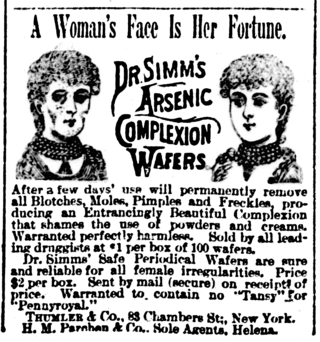Related Research Articles

A model is a person with a role either to display commercial products or to serve as an artist's model or to pose for photography.

"Junk food" is a term used to describe food that is high in calories from macronutrients such as sugar and/or fat, and possibly sodium, making it hyperpalatable, but with insufficient dietary fiber, protein, or micronutrients such as vitamins and minerals. It is also known as HFSS food. The term junk food is a pejorative dating back to the 1950s. Many variations of junk food can be easily found in most supermarkets and fast food restaurants. Due to easy accessibility, commercially-oriented packaging, and often-low prices, people are most likely to consume it.
Promotion of anorexia is the promotion of behaviors related to the eating disorder anorexia nervosa. It is often referred to simply as pro-ana or ana. The lesser-used term pro-mia refers likewise to bulimia nervosa and is sometimes used interchangeably with pro-ana. Pro-ana groups differ widely in their stances. Most claim that they exist mainly as a non-judgmental environment for anorexics; a place to turn to, to discuss their illness, and to support those who choose to enter recovery. Others deny anorexia nervosa is a mental illness and claim instead that it is a lifestyle choice that should be respected by doctors and family.

Body image is a person's thoughts, feelings and perception of the aesthetics or sexual attractiveness of their own body. The concept of body image is used in several disciplines, including neuroscience, psychology, medicine, psychiatry, psychoanalysis, philosophy, cultural and feminist studies; the media also often uses the term. Across these disciplines, there is no single consensus definition, but broadly speaking, body image consists of the ways people view themselves; their memories, experiences, assumptions, and comparisons about their appearances; and their overall attitudes towards their respective heights, shapes, and weights—all of which are shaped by prevalent social and cultural ideals.

Photograph manipulation involves the transformation or alteration of a photograph. Some photograph manipulations are considered to be skillful artwork, while others are considered to be unethical practices, especially when used to deceive. Photographs may be manipulated for political propaganda, to improve the appearance of a subject, for entertainment, or as humor.

False advertising is the act of publishing, transmitting, or otherwise publicly circulating an advertisement containing a false claim, or statement, made intentionally to promote the sale of property, goods, or services. A false advertisement can be classified as deceptive if the advertiser deliberately misleads the consumer, rather than making an unintentional mistake. A number of governments use regulations to limit false advertising.
Size zero or size 0 is a women's clothing size in the US catalog sizes system. Size 0 and 00 were invented due to increasing body sizes and therefore the changing of clothing sizes over time, which has caused the adoption of lower numbers. For example, a 2011 size 0 is equivalent to a 2001 size 2, and is larger than a 1970 size 6 or 1958 size 8. Modern size 0 clothing, depending on brand and style, fits measurements of chest-stomach-hips from 30-22-32 inches to 33-25-35 inches. Size 00 can be anywhere from 0.5 to 2 inches smaller than size 0. Size zero often refers to thin people, or trends associated with them.

Fast food advertising promotes fast food products and utilizes numerous aspects to reach out to the public.

Food marketing is the marketing of food products. It brings together the food producer and the consumer through a chain of marketing activities.

Exit International is an international non-profit organisation advocating legalisation of voluntary euthanasia and assisted suicide. It was previously known as the Voluntary Euthanasia Research Foundation.

Yaakov Noach Litzman is an Israeli politician and former government minister. A follower of the Ger Hasidic dynasty, he heads Agudat Yisrael, part of the United Torah Judaism alliance, in the Knesset. He previously served as Minister of Health and Minister of Housing and Construction. Litzman resigned from the Knesset in June 2022, as part of a plea agreement in which he admitted criminally obstructing the extradition of convicted pedophile Malka Leifer.

Danny Danon is an Israeli politician and former diplomat. A member of the Likud party, Danon served in the Knesset from 2009 to 2015, and re-entered the Knesset in 2022. From 2015 to 2020, Danon served as Israel's 17th Permanent Representative to the United Nations. The former leader of the world Betar organization, Danon was elected Chairman of the World Likud. Considered a 'right-wing thorn in Netanyahu's side," Danon challenged Benjamin Netanyahu for the party's leadership in 2007 and 2014.
Mordecai "Mordy" Bromberg SC is an Australian judge who was appointed to the Federal Court of Australia in 2009. He was previously a senior barrister, and in his youth also played four seasons of Australian rules football for the St Kilda Football Club.

Yves Saint Laurent SAS, also known as Saint Laurent and YSL, is a French luxury fashion house founded in 1962 by Yves Saint Laurent and his partner, Pierre Bergé. The company specializes in haute couture, ready-to-wear, leather accessories, and footwear. Its cosmetics line, YSL Beauty, is owned by L'Oréal.

The Advertising Standards Authority (ASA) is the self-regulatory organisation of the advertising industry in the United Kingdom. The ASA is a non-statutory organisation and so cannot interpret or enforce legislation. However, its code of advertising practice broadly reflects legislation in many instances. The ASA is not funded by the British government, but by a levy on the advertising industry.

Tobacco politics refers to the politics surrounding the use and distribution of tobacco.
Body shape refers to the many physical attributes of the human body that make up its appearance, including size and countenance. Body shape has come to imply not only sexual/reproductive ability, but wellness and fitness. In the West, slenderness is associated with happiness, success, youth, and social acceptability. Being overweight is associated with laziness. The media promote a weight-conscious standard for women more often than for men. Deviance from these norms result in social consequences. The media perpetuate this ideal in various ways, particularly glorifying and focusing on thin actors and actresses, models, and other public figures while avoiding the use or image of overweight individuals. This thin ideal represents less than 15% of the American population.
Brandalism is an activist artist collective founded in 2012 in the United Kingdom which engages in subvertising, culture jamming, and protest art. Brandalism uses subvertising to alter and critique corporate advertising by creating parodies or spoofs to replace ads in public areas. The art is typically intended to draw attention to political and social issues such as consumerism and the environment. Advertisements produced by the Brandalism movement are silk screen printed artworks, and may take the form of a new image, or a satirical alteration to an existing image, icon or logo. The advertisements are often pasted over billboards, or propped under the glass of roadside advertising spaces.

Gail Elliott is an English fashion designer and former model.
TV advertisements by country refers to how television advertisements vary in different countries and regions.
References
- 1 2 Bromberg, Marilyn; Halliwell, Cindy (2016). "All About That Bass' and Photoshopping a Model's Waist: Introducing Body Image Law". The University of Notre Dame Australia Law Review. 18. Retrieved 5 November 2017.
- ↑ "Israel: Restrictions on Depiction of Underweight Models in Commercials". www.loc.gov. Library of Congress. 26 March 2012. Retrieved 5 November 2017.
- 1 2 3 4 Friedman, Vanessa (2017-05-08). "A New Age in French — Modeling". The New York Times. ISSN 0362-4331 . Retrieved 2017-11-07.
- ↑ Friedman, Vanessa (8 May 2017). "A New Age in French — Modeling". The New York Times . Retrieved 5 November 2017.
- ↑ Kirka, Danica (14 June 2016). "London mayor bans Tube ads that promote unhealthy body image". Business Insider. Associated Press . Retrieved 5 November 2017.
- ↑ Samuels, Gabriel (12 May 2016). "Norwegian city bans adverts featuring semi-nude models". The Independent . Retrieved 5 November 2017.
- ↑ Wright, Jessica (19 March 2015). "Skinny models: Australia welcomes Paris ban". The Sydney Morning Herald . Retrieved 5 November 2017.
- ↑ "Voluntary industry code of conduct on body image". Analysis & Policy Observatory. 1 July 2010. Retrieved 5 November 2017.